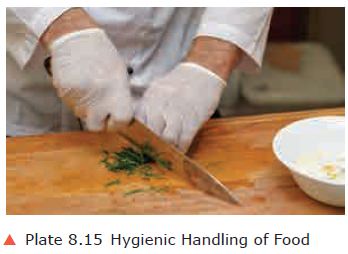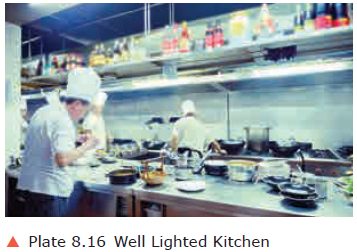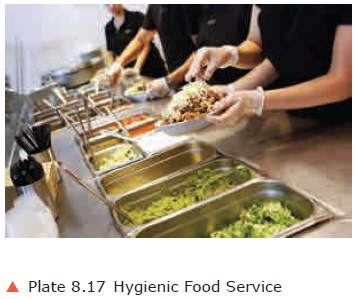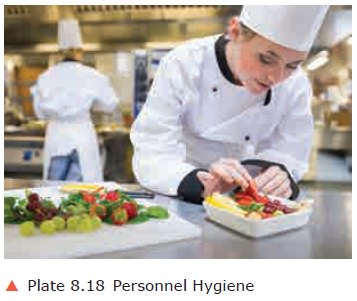Chapter: 11th Food Service Management : Practical: Chapter 8 : Food Microbiology
Hygiene and Safety in Food Service
Hygiene
and Safety in Food Service
In order to prevent food spoilage in food service following need to be
taken care of.
Safe Guarding of Food
Lack of proper attention to handling of food and negligence of personal
hygiene lead to food poisoning and require serious attention. The incidence of
food borne disease can be considerably reduced by certain healthy practices.
·
Cook at
high temperature to ensure that all bacteria are killed.
·
Keep all
perishable foods in a cool place or in refrigerator.
·
Cover
food to protect from dust, flies and other modes of infection.
·
Avoid
consuming moldy and foul smelling foods.
·
Avoid
damaged and bulging tin/ canned foods.
·
Wash the
foods carefully to ensure the removal of insecticide, worm, eggs, and other
parasites sticking to it.
·
Keep the
utensils free from contami-nation.
·
Ensure
food handlers are healthy and free from disease.
·
Avoid
taking food with dirty fingers.
·
Avoid
tasting food while cooking.
·
Maintain the three ‘E’s of safety – Engineering,
Education and Enforce-ment.
![]()
Food hygiene and sanitation is highly important in food service
operations espe-cially in larger scale as they might affect public health.
Quality control, micro-bial safety and good personal hygiene are essential to
keep food safe.
Kitchen Hygiene
Hygiene in the kitchen is very
important for the general cleanliness of the environ-ment and the people working
there as it requires handling of food materials.


(i) Environmental
Hygienic: The place
where food is delivered, prepared and served.
Site should be free from air pollution and insects, water supply and
sewage disposal should be taken care of. In structure, clean-liness of walls,
floors, ceilings or any sur-face should be free from any hazards of infections.
Equipment like furniture and fit-tings need most attention to make it
dust and dirt free. Thorough cleaning is required to avoid chemical residues
that may contaminate food.
Need for proper ventilation is required in all areas of the kitchen. All
kitchen should be provided with exhaust fans and extraction hoods above cooking
range to remove impurities.
Kitchen should be well lighted to detect dirt, grease and infestation
easily.
Water supply should be treated to ensure that it is fit for cooking and
drink-ing and washing utensils.
Kitchen waste like peelings, trim-mings, plate waste, spillage, empty cans and bottles must be disposed immedi-ately from the kitchen, never be allowed to remain anywhere near the production, storage or service area. All these become contamination of food.

![]()
(ii) Hygienic
Food Handling: In receiv-ing food materials quality of food received will go a long
way. Check for microorgan-isms, accidental chemicals and pesticides.
In storage proper methods should be followed.
1.
Temperature prevailing in storages.
2.
Humidity in the storage environment.
3.
Presence
or absence of any type of in-fection.

Handling food at the stage of prepa-ration is very important from
hygienic point as in receiving and storing. Food should be cooked as quickly as
possible after the preparation, unless frozen for later use. In food service
establishment food should be held for some time before service. The holding
temperature for food, within the danger zone is 100C to 620C. In service
food care is necessary to see all serving equipment is clean and server is not in any way contaminating the food. Tables must be
clean. Clearing up is a vital part as far as hygiene is concerned. Otherwise it
may spread infection quickly. All wastes should be emptied in pedal bins.
Disposal should be emptied into the garbage bins. Waste food should not be
transported open to safeguard the health of people.
(iii) Personnel
Hygiene: It refers to the general health, personal grooming and working
habits of all personnel.
In dress – Grooming – Health and Habits-following points should be
adhered.
a.
Wash
hands, cut nails, short hair trimmed.
b.
Clean
shaved,
c.
Do not
touch food when suffering from cold, fever, diarrohea, cholera, jaundice and
wound if any
d.
Avoid
licking fingers.
e.
Clean
working area regularly.
f.
Keep all
food covered.
g.
Have bath
daily.
h.
Brush
teeth twice a day.

i.
Cover
wounds properly.
j.
Wear
well-polished shoes.
k.
Handle
food correctly.
l.
Leaning
or sitting on the work table is an objectionable habit.
m. Resist from smoking.
n. Avoid chewing pans / chewing gums / betel leaves.
Safety: Safety
implies the concern for providing conditions at work, which will
protect people from infection, injury and theft. It also includes protection of
prem-ises, equipment and other resources from infestation, damage and
destruction. Safety measures to be adhered in food service operation for a healthy
environment are:
a.
Wear
clean cotton clothes and head cap.
b.
Switch
off the gas first from the knob on the cylinder and then switch off the knob of
the gas stove.
c.
In case
of fire close the main connec-tion / gas cylinder knob.
d.
Do not
place any newspapers, poly bags next to the lighted gas.
e.
Keep the
knives in a tray and then carry.
f.
Do not
leave any utensil unattended on the gas stove.
g.
Add
sufficient water in pressure cook-er, follow instructions carefully.
h.
While
frying hold the skillet firmly with tongs. Gently slide the food in hot oil.
i.
Keep
floors dry immediately wipe any spills on the floor.
j.
Cool the
food before grinding in the mixer / grinder.
k.
Keep fire
extinguishers in the lab at strategic points.
Related Topics